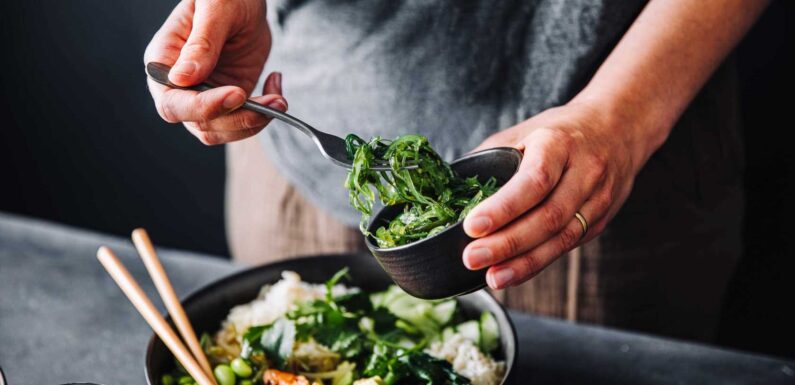
WAKAME is a staple in Japanese and Korean cooking.
The sea vegetable adds a salty-but-sweet taste to salads, soups, snacks and seasonings and frequently features in Asian cuisine.
But it could also have a number of health benefits.
First and foremost, wakame is packed with a wide range of vitamins, minerals and antioxidants.
It's high in vitamins A, C, E and K, as well as iron, copper, phosphorus, iodine, tyrosine and phytonutrients.
It's also a great source of magnesium, calcium and omega-3s.
READ MORE ON SUPERFOODS
The ‘superfood’ you’ve never heard of that boosts your sex life and only costs £4
I’m a dermatologist – the’superfoods’ that can be BETTER than Botox
But it's very low in calories, with 10g (or two tablespoons) containing just five in total.
Registered dietitian and nutrition scientist Emily Leeming told The Sun: "Edible seaweed is packed with nutrition.
"It's high in fibre, omega-3 fatty acids and also polyphenols – a group of antioxidants that are great for our health.
"Wakame is also a good source of iodine, which your body needs to make thyroid hormones keeping your cells healthy."
Most read in Health
Life-saving cancer drugs could help thousands more – thanks to Sun readers
Why sleeping naked can help you lose weight – and 9 other hacks to blast fat
Playing popular sport can double risk of skin cancer, research finds
I'm a GP & bowel cancer patient – please listen to George Alagiah & take tests
Studies show wakame could help maintain healthy blood pressure levels, reducing your risk of deadly heart disease.
A 10-week study in 2002 found that giving rats substances extracted from wakame significantly decreased systolic blood pressure.
Separate research in healthy Japanese children aged three to six showed that a higher intake of seaweed lowered blood pressure.
High blood pressure, or hypertension, can damage your arteries and decrease the flow of blood and oxygen to your heart.
This can lead to heart disease, kidney failure, vascular dementia and heart attacks.
Cholesterol also plays an important role in your risk of experiencing these health problems, as well as having a stroke.
Research is limited, but scientists believe wakame may help lower cholesterol levels and improve overall heart health.
Studies have also found that wakame could help decrease blood sugar, improve insulin resistance and aid weight loss.
A month-long study published in Nutrition Research and Practice showed eating 48g of seaweed every day significantly lowered blood sugar levels in 20 people with type 2 diabetes.
Another report revealed wakame could prevent insulin resistance, while a third discovered it warded off weight gain in mice on a high-fat diet.
DIVERSIFY YOUR DIET
There is even growing evidence to suggest that adding seaweed into your meals could assist in shedding pounds and reducing your waistline.
But one of wakame's biggest areas of promise is how it may support proper thyroid function.
An estimated 2.2billion people worldwide could be iodine deficient, according to a 2022 review by the US Army Research Institute of Environmental Medicine.
This can result in weight gain, fatigue, hair loss and dry, flaky skin, experts say.
But iodine makes thyroid hormones which help keep cells and the metabolic rate (the speed at which chemical reactions take place in the body) healthy, so without it, problems can arise.
Adults need 140micrograms of iodine per day, according to the NHS.
Wakame contains about 42micrograms per gram, so you'd only need to eat 3.5g to meet the recommended daily requirement.
Other food sources of iodine include cows' milk, eggs and fish.
Not getting enough can contribute to hypothyroidism, where your thyroid doesn't produce enough hormones.
Edible seaweed is packed with nutrition.
Dr Leeming, from King's College London, said: "There’s evidence in mice and rats that eating wakame is good for your blood pressure, cholesterol levels and potentially fighting cancer, but mice aren’t humans and we don’t know if these benefits are the same in human beings.
"In humans, there’s very early evidence that eating edible seaweed can help with your blood pressure, but we don’t know enough yet to know for sure.
"Having a balanced diet full of different foods and plant foods is best for our health over one particular food.
"There’s no such thing as one ‘superfood’. It’s about having a diverse diet that will give us the nutrients that we need.
"Wakame and other edible seaweeds are a great new vegetable to try and are great for your health, but don’t feel like you need to overdo it."
She also warned that eating too much wakame could be bad for your health.
"Certain brands have high levels of salt, and too much salt can increase your blood pressure," Dr Leeming added.
She recommended keeping an eye on the ingredients list, then soaking it in its dehydrated form in warm water.
"It's great to add as an extra type of leafy green in salads," she said.
Wakame, which is native to the cold waters of northeast Asia, is available in local Asian markets and supermarkets, as well as in health food stores and online.
Prices start at around £1.60 per small bag, rising to £6 from BuyWholefoodsOnline and £13 in bulk from Amazon.
Read More on The Sun
Emmerdale brings back legendary star after 24 years – but with a major twist
Stunning £3 day out taking the UK by storm – and it’s all down to Covid
It usually comes dried, so you'll need to blanch it before eating.
Wakame is commonly added to miso soup and seaweed salads.
Source: Read Full Article









